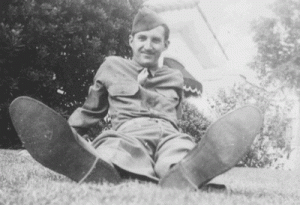 “Yeah, when I was eight I saw my Grandpa burn a flag. In an old trash can he had, but in the heat of summer. Boy did he sweat. This was 1976, the Bicentennial year, and the flag was older than I, something he’d had and flown for many years.
“Yeah, when I was eight I saw my Grandpa burn a flag. In an old trash can he had, but in the heat of summer. Boy did he sweat. This was 1976, the Bicentennial year, and the flag was older than I, something he’d had and flown for many years.
“It was ragged dirty, but what sealed its fate was a replica of what was called a “Bennington” flag, a half circle of stars surrounding an antiquated ‘76’. Grandma bought it for him. Real cotton. Both were real cotton.
“As my Grandpa poked the fire, he asked me if I knew why he was burning it, and I had a clue: you don’t, he constantly grumbled, throw a flag in the trash with the rest of the garbage. I remember as we walked out of the kitchen he nodded at the trash can just so I could get the right idea.
“The old guy used to hate to see people mistreat the flag. We would drive down State Street in Saginaw and he would grouse about the car dealerships and Texan Restaurants with their tattered flags “left to rot in the rain” as he said. Grandpa would take his flag down every night at sunset, wouldn’t fly it in bad weather. I read somewhere you’re supposed to put it up at dawn, but he never did–it went up when he woke. And he didn’t wake at dawn, I can tell you that.
“I guess you could say it was a reaction to the 70s, ’cause Grandpa wasn’t a right-winger or anything. Kept his politics close to the vest. But when things were turning to shit and Nixon and Ford and Carter were the best you could get for leaders, when he was eating frozen foods and pissed about the antics of the soldiers on “M.A.S.H.” and my father’s earring (which landed him somewhere between “a drug dealer and a fag”), perhaps respecting the flag in such a manner was what gave him a modicum of pride. I don’t know.
“My father and I definitely don’t revere the flag like he did, if at all. But that’s our right. In fact, my Grandpa told us as much. He said that’s he and everyone else fought for in the big one. In World War II.”
Upon seeing a copy of Stud’s Terkel’s The Good War displayed at the library I worked, an old gent, a regular, looked like he was going to throttle someone, hopefully not me. Finally, he grabbed the book and said:
“‘Good War?’ What ‘Good War’? There’s no such thing as a ‘good war’. God damn…”
“You know, he was a medic during World War II. I always liked that: he was a medic, he didn’t kill people, he tried to save them. He landed in Normandy, a hundred and twenty minutes after the first shot was fired. Read his journals, they’re sad. He’s trying to sound upbeat, talking about the ‘Skipper’ upstairs looking after him, but he must have been scared shitless. His landing craft got hooked on one of those giant, what do call ‘em?, giant crosses in the water. Meant to hook a landing craft and then you blow the shit out of ‘em. Or the men onboard jump off and wade ashore. As you can imagine, this was a terribly rough road: he didn’t know how to swim, so jumping into the deep channel on a windswept day was a horrible thought. A German bomb unhooked their landing craft and they were allowed to run ashore. Cost ‘em ‘five boys’ Grandpa said, like it was nothing. I think about that: while others ran ahead, firing their guns, aware of the dead and dying but not one of them, he had to stop and see the results firsthand, tend to the wounded. The shouting, praying, remember me to so-n-so. When he was done administering triage to the worst casualties, dodging bullets himself, he then beat it back to a trench just before the German planes strafed the beach. There, as night fell, he would hear the soldiers he had saved scream for help as the tides came in and drowned them, every one, a sound that would haunt him the rest of his life.
“In fact, no one would have known about this if he hadn’t he told my aunt many, many years later.”
“Why do I have this limp? I’ll tell you: unions, that’s why. The God damn unions.
“OK, OK, I got hurled from a jeep in France, broke my leg up. All over. Damn driver hit a cow. I got two purple hearts for being shot, but I was lucky: neither did much damage. It was that cow, that idiot driver, and the unions.
“The busted leg sent me home. They wanted a surgeon to look at it, someone decent, stateside, New York City. I’m on the boat, and we get hung up off the coast of New York. God damn Longshoremen were on strike. Kept me from getting surgery. Bastards.”
“That violin is something special. My great-great-grandfather fought in the Civil War. He was in Sherman’s March. They were burning everything they could lay their hands on, burning, burning, not allowed to keep so much as a handkerchief. Let it go, let it burn.
“Well, this lady runs out of the house carrying this violin. She’s hysterical, screaming. She gave my grandfather this violin and said, ‘Please, this is too beautiful to destroy. I don’t care who keeps it, just don’t destroy it.’ Sure enough. When he told his commander the story, I guess it got back to Sherman who told him to keep it. To treasure it. Legend has it that Sherman looked terribly pained…”
“I wear this jacket because I like it. Wore this in the Army, when I fought in Vietnam. I didn’t want to go, I was drafted. It was worse though, for others. I saw guys go who could have made so much of themselves. Came back scarred, injured. Ruined. I hated that. Myself, I feel like I could survive anything. And, in a way, I did. But I know others who didn’t. What doesn’t kill you makes you stronger? So fucking what. I don’t want to be strong if that’s what it amounts to.
“Tell you what: I don’t cotton to those bumper stickers. ‘If you love your freedom, thank a vet.’ We haven’t fought to preserve freedom since World War II. Korea, Vietnam, Grenada, Iraq, and Iraq again. Nope. I fought in Vietnam. I did not work to preserve anyone’s freedom. I wish to God I had.
“Here’s a funny story though: I’m in my jacket at the grocery store, at Glen’s, and I get approached by this guy. From the Michigan Militia! The guys who made Timothy McVeigh, the guy who blew up the Alfred P. Murrah building in Oklahoma City. Whew! If that’s not a Vonnegut moment, I don’t know what is.”
“It’s funny, but here I am, a man who survived the sinking of the Indianapolis and it doesn’t seem to have affected me. My pals, all of them, they need to see psychiatrists. For myself, I just said that I was going to live or going to die, but I wasn’t going to make it easy to die. I prepared. And I lived. I’m fine with that, I don’t think it was anyone’s fault. I’m glad we’re talking about it today; not just you and I, but in general.
“One of the great things people forget about Vietnam was that, for all the troubles, they had treatment. There was no stigma, or not much, to go to counseling, to get help. They needed help. But the men I sailed with, and men I knew who fought in Korea, they needed help and they didn’t get it. They were given parades. They were given the G. I. Bill. Those were good. But you hear people complain about the drug addicts of Vietnam, and I’m here to tell you that my generation, we were alcoholics. That was our drug.
“Not me: I was lucky to have somehow missed that. I don’t drink: I never have. Never developed a taste for the stuff. But I can see, you know? With my eyes I can see friends that needed help, and didn’t get it until they were old men.”
“My Grandpa fought in World War II. Shit, when I told my family I was enlisting in the Army they were the usual: happy, a party, proud of me. That was great. I was a bit of a fuck-up, and the Army helped me clear that up. But anyway, so one night, late, around one, I get this phone call. My Grandpa. I can tell he’d been drinking. You know how a voice gets thick, after a few? That was him.
“He says: ‘Don’t be a hero.’ I told him I wouldn’t. He said: ‘No. I mean it. Don’t be a hero.’
“Well, I told him, OK, OK, just get off the phone and get back to drinking. But then he tells me this story.
“He and his unit were somewhere in Germany. It was him and six other guys, a sergeant and this idiot captain who was along for God-knows what reason. The sergeant and another guy take off to scout and see how we’re sitting: the German infantry is nearby. Don’t go anywhere, the sergeant said. Well, a half an hour goes by, and this dope of a Captain gets nervous sends a guy out to look for the sergeant. Fifty yards away, boom, he’s shot dead. So the captain orders another guy to go: same thing. Well, Gramps told me right then he cocked his rifle and was ready to shoot the captain if he told him to go next.
“But the sergeant returns, wants to know where the other two went. The captain told him. There was no argument from the sergeant. After all, the guy outranked him. But you could see he was steaming.
“Next day, at dawn, the sergeant woke the four men remaining and tells them to pack up, they’re heading out. There’s no captain. They asked the sergeant where he was, and he wouldn’t answer. They never saw him again.
“Crazy, huh? Nothing like that ever happened to me of course. I was in Germany, too, during the end of the Cold War. You go into a field, you could find helmets buried in the dirt, bullets, great stuff. It was relatively easy.”
“Dad was in the Navy, to avoid fighting in Vietnam. In that last respect, and that respect only, he is just like President George W. Bush.”
